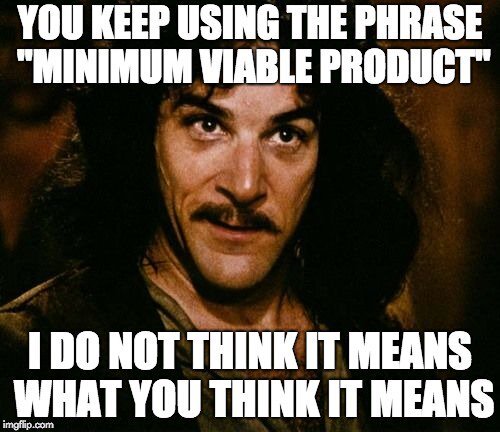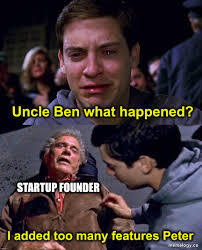Who Should Build My Startup MVP?

You have a revolutionary idea but have no idea where to start to get it off the ground. You don’t want to be one of the 90% of startups that fail. A Minimum Viable Product (MVP) can save you from this. It is the simplest version of your product to test your assumptions while:
- Reducing risk through minimal resources and investment
- Understand the market and gain customer feedback
- Build investor confidence
- Make necessary improvements and pivot your strategy if needed
- Demonstrating the market demand
- Get to market faster
It’s like planning a mini product party where you’re inviting users to try out the first taste of what you're cooking.
Choosing the right development partner from the offset is crucial to ensure a smooth and effective launch. Finding yourself stuck with a partner who isn’t a good fit could result in:
- Delays
- Wasted budget
- Frustration
- Wasted time and resources
- Product-market misfit
- Poor product quality
So, let’s discuss your options to make your idea a reality. The right way.
Traditional Software Development Agencies
Calling in the pros from a traditional software development agency to create your MVP typically takes approximately 2-6 months. They often get bogged down in lengthy planning phases, building your MVP from the ground up with heavy emphasis on customization.
They dive into many planning meetings, custom code every little detail, and take their time crafting your product. While you might end up with a shiny, well-tailored MVP, the process can be slow and expensive. The meticulous attention to detail, though admirable, can sometimes feel excessive, especially when you’re eager to get your idea off the ground quickly.
[.box-green]
Pros
✅ High customization
✅ Robust security
✅ Long-term scalability
[.box-green]
[.box-red]
Cons
❌ High, unfixed cost
❌ Longer timelines
❌ Substantial initial investment
❌ Long hiring cycle
[.box-red]

Freelancers
Before you embark on hiring freelance developers, it is vital to do a proper product scope. This is an intensive, structured process to look at your product vision from a business standpoint. Now you can identify the right person for the job. However, it’s not as easy as picking a name out of a hat.
Unlike traditional agencies, you can hire freelancers on an hourly or project basis, making them a more flexible and cost-effective option. They can jump in as a temporary team member, driving straight into the trenches with you to help shape your MVP.
But here’s the catch: managing freelancers is a hands-on experience. You’re not just hiring a person; you’re taking the role as part-time project manager. There’s a few vital points to consider when hiring freelancers.
Trust
If you’re a non-technical entrepreneur, how do you know if you can trust freelance developers to make the big decisions? You need someone with experience to choose the best option in regards to programming language and architecture. Keep an eye out for a developer who’s more interested in finding the right solution for you than in selling you their own skill set.
Management
If you aren’t experienced in building and managing a team of freelance developers, it’s not easy. There are 12 developer archetypes to keep in mind to build a balanced team.
Communication and Availability
You may find the perfect team for your MVP and come to the realization they aren’t available for when you want them. Clear and concise communication is key to running a successful freelance team.
Dependency
Your freelance developers must play by the rules when it comes to organizing and documenting their code. If they don’t, future developers on your team might end up scratching their heads trying to figure out what’s going on as your project grows.
Regardless of what industry-standard practices they use, they need to be consistent, use good architecture, and have maintainable code. Especially in the future when other developers are updating your product. Think of it like running a kitchen, you want every chef to follow the same recipe so that no matter who’s cooking, the dish comes out perfect every time.
Scalability
Your project is going to grow up sooner or later. When you pick a developer, you’re choosing to work with one person. If you need more help later, you’ll have to start the whole hiring process from scratch.
Reliability
Missed deadlines is a major issue when working with freelancers. It can be a real headache. It’s extremely difficult to make an accurate time estimate for software development.
A good technique for code quality assessment is giving the developer a simple task assignment. If all goes well, provide them with a more complex task. If they nail it, it’s time to decide if they’re a keeper. The technique is time-consuming but worth it to make sure you have the best team.
[.box-green]
Pros
✅ Flexible
✅Wide talent pool
[.box-green]
[.box-red]
Cons
❌ Less accountability
❌ Varies in quality
❌ Potential for missed deadlines
[.box-red]

No-Code Solutions
No-code platforms are tools that allow users to build applications without writing a single line of code, by using visual interfaces and pre-built components. For example, Webflow, Bubble, and Thunkable. However, even these platforms have their quirks. The most common are:
- No IP ownership: you’re essentially renting the tools to build your product. This means you don’t own the underlying code, which can be a major issue if you ever want to make big changes or pivot your business. Your intellectual property stays tied to the platform, and if they change their terms or go out of business, you might face problems.
- Functionality restraints: no-code MVPs aren’t completely customizable as they have limited functionality, which can hold you back from delivering the unique experience your users expect.
- Not scalable: eventually you will need to start from scratch as your MVP grows and demands more complex features.
- Difficult to use: it’s believed anyone can build a product or website using a no-code solution. In reality these are complex tools that take a long time to learn, which could result in significant time to market delays - completely defeating the purpose of choosing a no-code solution in the first place.
- Over complication: it’s tempting to deck out your MVP with glitter and shiny things. Less is more. Stay focused on your main value and avoid overloading your MVP with fancy features. Keep it simple and true to what you’re trying to serve up.
[.box-green]
Pros
✅ Quick to launch
✅ Minimal technical knowledge needed
✅ Lower cost
[.box-green]
[.box-red]
Cons
❌ Limited customization
❌ Potential scalability issues
❌ Dependency on platform
❌ IP ownership issues
[.box-red]
Finding a Technical Cofounder
Finding your dream CTO (Chief Technical Officer) won’t be easy and could take many months and countless hours interviewing. You want someone who’s going to make your startup dreams sparkle. The whole point of building an MVP is to reduce your time-to-market so it can be tempting to commit to the first “okay” candidate you chat to. It’s important to remember, choosing your CTO is a major move for your startup, so choose wisely.
Here’s a checklist of the traits your perfect CTO should have:
- Passion: your CTO’s passion level for your idea should come as a close second to yours. If there’s no passion, during the storms you could find yourself navigating the lightning strikes alone.
- Expertise: they should have the technical skills to match your business skills.
- Commitment: your CTO needs to commit as much time to the company as you to create a balanced and harmonious relationship. A CTO with another full time job that treats your startup as a “side-gig” can leave a bitter taste.
- Leadership skills: look for someone who can rally the troops and keep the moral high even on darker days. A CTO who’s also a great motivator makes the whole team work better together. If your CTO can’t lead them, they will be ineffective.
- Management skills: you’ll need to find someone who can be realistic on the timeframe and effort needed to build your product to avoid significant delays and costs.
[.box-green]
Pros
✅ Deep technical expertise
✅ Long-term commitment
✅ Aligns with your vision
[.box-green]
[.box-red]
Cons
❌ Challenging and time consuming to find the right fit
❌ Potential equity split
❌ Slower time to market
[.box-red]
The Solution: Verticode
At Verticode, we believe launching a startup MVP should be a breeze, not a marathon. Forget about sky-high development costs, endless timelines, and no-code platforms that compromise your intellectual property and make building your business feel overwhelming.
With our tools, we speed up MVP development, delivering projects up to 10 times faster than the industry norm. This means you get a wallet-friendly solution with complete code ownership where you’re free to tweak, twist, and evolve your product however you need, without any digital handcuffs holding you back.
In only 2 years, Verticode has launched over 50 MVPs with an average 2 week build time. This may frighten you but rest assured with our 5* Trust Pilot reviews you’re in safe hands.
[.box-green]
Why Choose Us?
- Affordability: we’re up to 80% lighter on your wallet than those pricey agencies
- Tailored solutions: we build MVPs to fit your needs - no one size fits all here
- Speed meets quality: we balance rapid delivery with amazing quality
- Our secret sauce: our brilliant tech team whipped up some groundbreaking, proprietary technology that revolutionized MVP development, making it faster and more amazing than ever seen before
- Future proof: we build with scalability in mind so your product can grow
[.box-green]
Ready to bring your vision to life?
Book a free, no-obligation meeting with us to talk through your MVP and get an exact quote and timeline.
.avif)
.svg)
